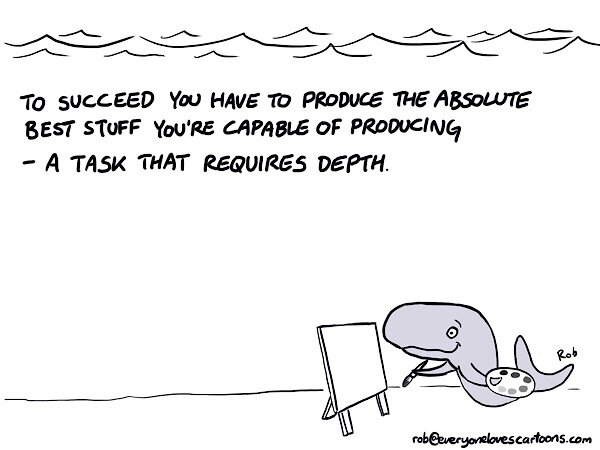Thoughts on Deep Work™
from: 2022-12-21The subject of “deep work” resonates with me, I have a habit of getting stuck in a problem. This is where a particular piece of work becomes all-encompassing, and I find myself accidentally working late into the evening or over a weekend1 While this often results in sprints of productivity, it causes problems when I want to switch off at the end of the day and spend time with my partner or friends.
I hadn’t considered the possibility of making a deliberate practice of this trait of an obsessive brain. However, approaching this habit deliberately might help train me to switch it on and off, as well as focus it on work that isn’t quite as engrossing. In this post, I want to document some of the ideas that I liked from Cal Newport’s book on the subject of “deep work” and discuss how I will integrate them into my approach to work.
 Source: www.everyonelovescartoons.com/blog/Illustrated-booknotes-deep-work.
Source: www.everyonelovescartoons.com/blog/Illustrated-booknotes-deep-work.
Blocking your time into project-specific periods lends itself actively to “deep work”, for the given period of time to focus only on a single project. I typically have five or six projects running simultaneously, and have found myself working on one of them for an extended period and then neglecting it for a long stretch, while I catch up on others things. The activity of block time and actively deciding to work on project X has the power to reduce the amount of time I get stuck in a single project. Therefore, I decided on the following takeaway:
1. Create work blocks with a minimum length of one week, decide which project will be worked on in advance and put this in my calendar as a reminder.
Newport advocates for a shutdown ritual that indicates the end of a period of deep work. This is a procedure that ensures that the work is documented and will help to turn off the part of your brain that has been focused deeply. This idea will be valuable if one can get it to work. Therefore, I will introduce the following practice:
2. At the end of the work day, make notes on the work conducted and detail the next steps. If you have any new ideas after the work day is finished put this in a note but think no further on them until the next day.
Planning every minute of a workday literally means writing down what you will work on at the start of the day. Unless there is a good reason (which allows flexibility as the plan can be rewritten), this plan should be followed. I will test this practice by:
3. Make a plan at the start of each work day and review it continuously by time-tracking.
However, I worry that often it is hard to quantify how long a task will take. By time-tracking deep and shallow work, it will also be possible to quantify where I am spending too much/too little time.
Newport suggests that one should be “hard to reach” by email, reducing the “shallow work” (the arch enemy of “deep work”) load as a result. This includes not replying to an email if:
“Nothing really good would happen if you did respond and nothing really bad would happen if you didn’t.”
I dislike this language, it suggests that one’s need to perform “deep work” is more important than anyone else’s. Furthermore, this approach (1) assumes everyone follows the email practice that Newport outlines in the book and (2) strikes a very pompous tone. With this in mind, I propose the following adjustment to my current approach:
4. Be a good/kind email user, but limit usage to the start of the day (replying to email from the previous day) and the end of the day (checking there are no fires).
Reading this book made me think critically about how I focus. I admit to being rather bipolar with focus; sometimes completely in the zone and other times, completely distracted. I would like to become a more focused, deliberate person, and to this end, I am making a conscious effort to focus on things, both at work and at home. Hopefully, this will help me pay more attention to the TV shows and films that I watch instead of looking at my phone.
-
As I write this, I am ignoring a stomach rumbling for some lunch. ↩
